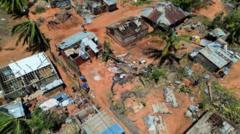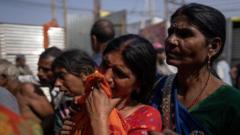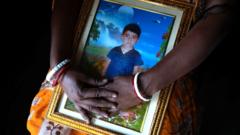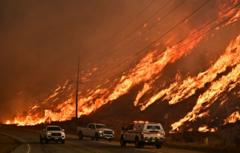Cyclone Chido has wreaked havoc in Mozambique, resulting in 94 deaths and impacting over 622,000 individuals. Damaged educational and healthcare infrastructure adds to the crisis, prompting government responses and highlighting urgent needs for resilient planning against climate challenges.
Cyclone Chido Devastates Mozambique, Rising Death Toll Amid Growing Displacement

Cyclone Chido Devastates Mozambique, Rising Death Toll Amid Growing Displacement
Cyclone Chido claims 94 lives in Mozambique, leaving over 622,000 affected and infrastructure critically damaged, raising urgent calls for assistance.
Cyclone Chido has left a devastating mark on Mozambique, with local authorities reporting a death toll of 94 following its landfall last week. As the cyclone struck the eastern African nation on December 15, winds reached speeds of 260 km/h (160 mph), coupled with a staggering 250mm of rainfall in the cyclone's initial 24 hours.
The National Institute of Risk and Disaster Management (INGD) estimates that 768 individuals sustained injuries, while more than 622,000 people experienced varying degrees of disruption due to this catastrophic event. The storm initially wreaked havoc in Mayotte before advancing onto Mozambique, Malawi, and Zimbabwe, impacting several northern provinces known for their vulnerability to cyclonic activity.
The cyclone first made contact with Cabo Delgado before continuing its destructive path through Niassa and Nampula. The INGD has reported that the educational and healthcare sectors were severely impacted, with more than 109,793 students affected and critical school infrastructure suffering substantial damage. In addition, 52 health facilities were reported damaged, posing significant risks to access essential health services, especially in areas already grappling with limited resources prior to the cyclone's arrival.
Daniel Chapo, a top figure in Mozambique's ruling party, highlighted the government's commitment to mobilizing support across all sectors in response to the crisis. During a visit to the stricken Cabo Delgado region, he emphasized the collaborative efforts with the INGD to assist those affected in Mecúfi, Nampula, Memba, and Niassa.
In Mayotte, Cyclone Chido marked the worst storm in nearly a century, leading to at least 35 fatalities thus far. Authorities are bracing for the possibility of the death toll rising, with projections suggesting it could reach into the hundreds or even thousands. Over 1,300 emergency responders have been deployed to aid the local population, but many residents remain without basic necessities. Efforts are underway to establish an air bridge to facilitate the delivery of vital equipment and supplies from mainland France.
As stated by the INGD, this cyclone underscores the urgent need for resilient planning to mitigate future disasters linked to climate change. The Intergovernmental Panel on Climate Change (IPCC) indicates a strong correlation between human activities and increased precipitation during tropical cyclones, emphasizing the unpredictable complexities of these intense weather events.
The National Institute of Risk and Disaster Management (INGD) estimates that 768 individuals sustained injuries, while more than 622,000 people experienced varying degrees of disruption due to this catastrophic event. The storm initially wreaked havoc in Mayotte before advancing onto Mozambique, Malawi, and Zimbabwe, impacting several northern provinces known for their vulnerability to cyclonic activity.
The cyclone first made contact with Cabo Delgado before continuing its destructive path through Niassa and Nampula. The INGD has reported that the educational and healthcare sectors were severely impacted, with more than 109,793 students affected and critical school infrastructure suffering substantial damage. In addition, 52 health facilities were reported damaged, posing significant risks to access essential health services, especially in areas already grappling with limited resources prior to the cyclone's arrival.
Daniel Chapo, a top figure in Mozambique's ruling party, highlighted the government's commitment to mobilizing support across all sectors in response to the crisis. During a visit to the stricken Cabo Delgado region, he emphasized the collaborative efforts with the INGD to assist those affected in Mecúfi, Nampula, Memba, and Niassa.
In Mayotte, Cyclone Chido marked the worst storm in nearly a century, leading to at least 35 fatalities thus far. Authorities are bracing for the possibility of the death toll rising, with projections suggesting it could reach into the hundreds or even thousands. Over 1,300 emergency responders have been deployed to aid the local population, but many residents remain without basic necessities. Efforts are underway to establish an air bridge to facilitate the delivery of vital equipment and supplies from mainland France.
As stated by the INGD, this cyclone underscores the urgent need for resilient planning to mitigate future disasters linked to climate change. The Intergovernmental Panel on Climate Change (IPCC) indicates a strong correlation between human activities and increased precipitation during tropical cyclones, emphasizing the unpredictable complexities of these intense weather events.






















